NewsBeat
Relief as first UK patients fitted with app-controlled sleep apnoea microchip | Science, Climate & Tech News
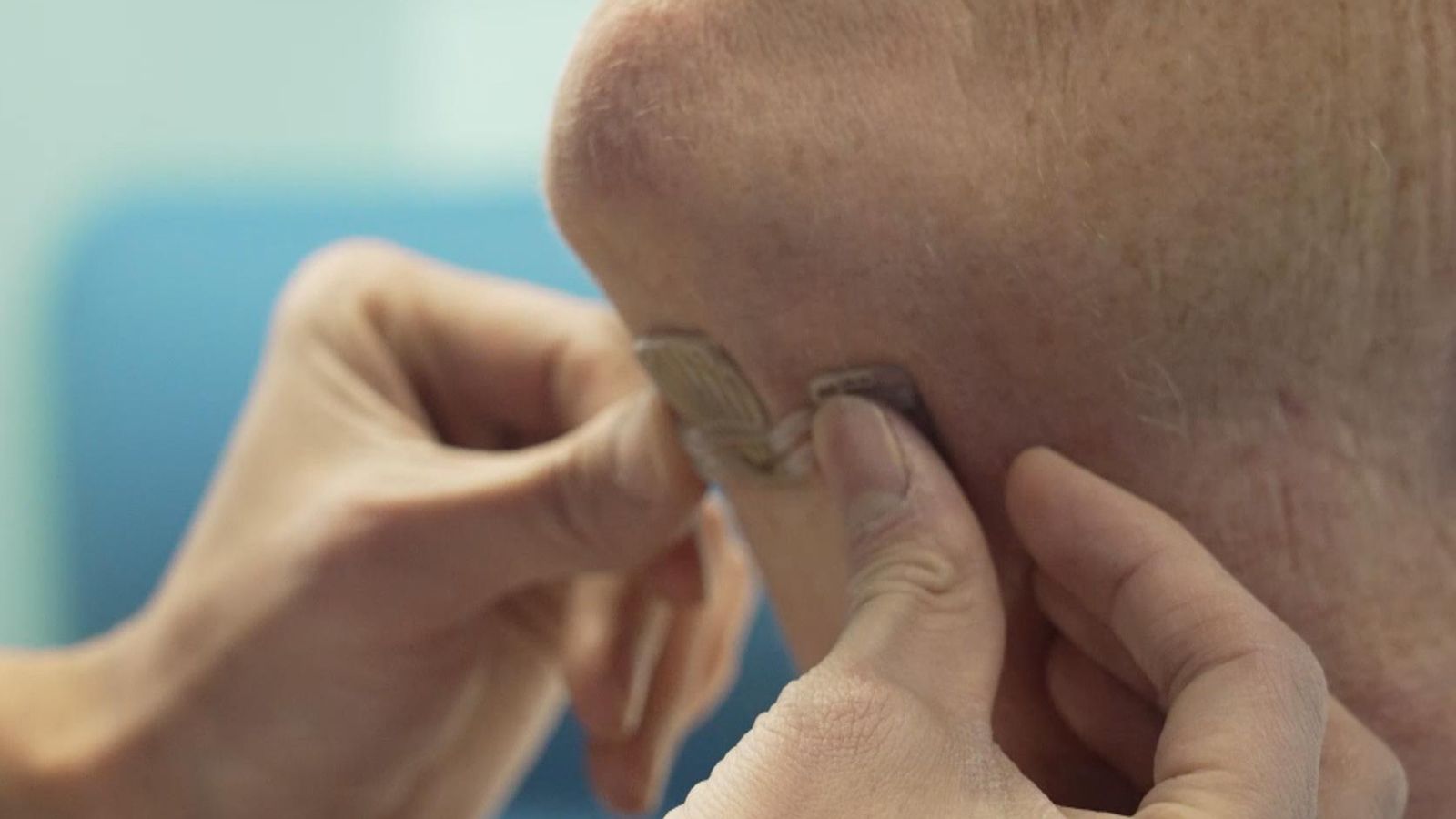
A new electronic chip could bring relief to patients with a serious disorder that stops them breathing in their sleep.
Eight million people in the UK suffer from sleep apnoea. Their airway becomes obstructed, and their breathing repeatedly stops for several seconds or even minutes.
But surgeons have now begun implanting a chip on a critical nerve, helping people to breathe.
Sky News was given exclusive access to one of the first NHS operations, carried out at University College London Hospitals (UCLH).
The patient, Natalie Boller, has had sleep apnoea for 10 years. The condition means she can stop breathing up to 30 times an hour.
She only became aware when her husband became concerned.
“He’s afraid I’m going to die,” she said.
“He says it sounds awful, choking and gasping.
“So as soon as I heard about this new technology, this implant, I was very interested because everything I’ve tried hasn’t worked.”
Surgeons made a small incision under Natalie’s chin, then placed the chip on a nerve that controls a muscle in her tongue.
A better night’s rest
Consultant sleep surgeon Ryan Chin Taw Cheong said the chip sends “a mild electrical pulse to stimulate the nerve, to move the tongue forward, and it opens up the upper airways.
“It means that patients are able to have a better night’s rest and breathe smoothly throughout the night.”
Sleep apnoea affects both men and women. Those with the condition snore heavily and soft tissues in the mouth and throat close up the airway and obstruct breathing.
The lack of oxygen can lead to hypertension, strokes, heart attacks, and diabetes. Some patients die as a result.
“In severe untreated obstructive sleep apnoea that can be as high as 1 in 3 within ten years,” Mr Cheong said.
The most common treatment at present is a Continuous Positive Airway Pressure (CPAP) machine.
A pump blows air through a mask into the mouth and throat, keeping the airway open. But it is so uncomfortable a third of patients stop using it.
Patients return to have the implant switched on
UCLH is the first NHS centre to offer two slightly different chips – one called Genio Nyxoah and the other Inspire – to patients with moderate or severe sleep apnoea.
Patients return to the hospital around six to eight weeks after the operation to have the implant switched on and the level of stimulation adjusted to a comfortable level.
They are then able to turn on the device with a remote control or a smartphone app when they go to bed.
Some patients sleep so soundly that they even start to dream for the first time in years.
‘I look forward to going to bed’
Olivia Rushton was fitted with a nerve stimulator in June and has just returned to hospital to be monitored overnight.
Her tongue moves out of the way just as it should when the device is activated.
And interruptions to her breathing while she sleeps have dropped by almost two thirds.
“I look forward to going to bed now,” she said.
“All I have to do is switch on and I will go into a much healthier, longer deep sleep.”
Surgeons will continue adjusting the frequency of the nerve stimulation to increase the effectiveness without causing her discomfort.
The UCLH team said the operation is being limited to a small number of patients who can’t use CPAP machines and are most likely to benefit from the implant.
NewsBeat
High winds continue as nearly a million without power

BBC News
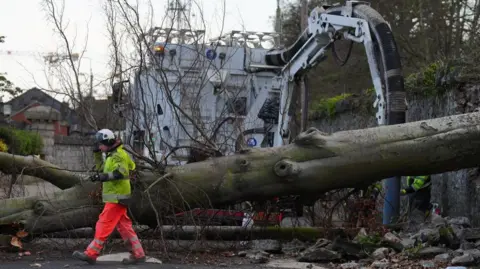 PA Media
PA MediaNearly one million properties are without power in the UK and Ireland while trains and ferries have been cancelled as emergency responders work to fix the damage caused by Storm Éowyn.
The storm brought gusts of more than 100 mph (161 km/h) on Friday, leaving one man dead after a tree fell on a car in Ireland.
While the fiercest gusts passed on Friday, Storm Éowyn – pronounced AY-oh-win – is expected to bring strong winds into the weekend.
An amber warning for wind is in place for parts of Scotland until 06:00 GMT on Saturday, and all trains in Scotland remain cancelled until 12:00. Yellow warnings for rain, wind, snow and ice will last as long as until Monday morning in other areas.
Hundreds of trees have fallen, causing damage to properties, blocking roads and disrupting train lines.
Ireland’s Electricity Supply Board said it will take a “significant number of days” to bring back power, while Northern Irish officials warned it could be up to 10 days before all those affected are reconnected.
In Ireland, 625,000 homes and businesses were still without power on Friday evening and around 138,000 people without water.
About 214,000 properties had no power in Northern Ireland, 106,000 in Scotland and 20,000 in north-west England.
Northern Ireland’s infrastructure department said it would take days to assess the storm’s damage, with more than 1,800 fallen trees, branches and other debris blocking roads.
Northern Irish Education Minister Paul Givan said 60 schools had reported “significant damage to some buildings”.
A key focus was identifying schools unable to open on Monday and providing information to parents, he said on X.
“Public services and society has been significantly impacted by the storm that will require a collective and co-ordinated effort in the days ahead to fix,” he added.
While the strongest winds have passed, the storm is still expected to bring gusts of more than 80mph (128km/h) across the coast and hills of Scotland and Northern Ireland.
 Reuters
ReutersMark Jones, who lives in Coldingham in the Scottish Borders, described Storm Éowyn hitting his area like “an earthquake”.
On Friday morning, he saw his corrugated iron carport being lifted out of the ground and tipped into an area of woodland.
“I didn’t feel seriously alarmed because there was about 30ft between me and the carport and it just lifted up quite steadily and tilted over,” he recalled.
“I just think the word ‘storm’ is too mild for what we have witnessed here. Only a hurricane could do that.”
Liam Downs, an electrician from Cardross on the north side of the Firth of Clyde, has been driving up and down the coast helping the local community, including removing trees from the road.
While going to check on a client in nearby Rosneath, he saw “about 10 trees” fall within the space of 10 minutes which “completely blocked us in the one-way road”.
“As we were driving along the coast earlier, waves were coming up onto the road and my van literally went from being in the right lane to being up on the curb,” he said, adding: “Thankfully, we’re in quite a big van”.
 Barry Corr
Barry CorrNine UK warnings remain in place:
- Amber warning for wind across parts of Scotland from 13:00 on Friday to 06:00 on Saturday
- Yellow warning for wind across most of the country from midnight on Friday until 23:59 on Sunday
- Yellow warning for snow in parts of Scotland from 06:00 until 23:59 on Friday
- Yellow warning for snow and ice for Northern Ireland from 19:00 on Friday until 10:00 on Saturday
- Yellow warning for wind in parts of Scotland from midnight until 15:00 on Saturday
- Yellow warning for snow and ice in parts of Scotland from midnight until 11:00 on Saturday
- Yellow warning for ice for Midlands, east and south-east England and Wales from 03:00 until 10:00 on Saturday
- Yellow warning for rain for Wales and most of England from 08:00 on Sunday until 06:00 on Monday
- Yellow warning for wind for south-east and west England, Wales, Northern Ireland and south-west Scotland, from 08:00 until 15:00 on Sunday
NewsBeat
Hospitals awaiting rebuilds face sewage leaks and delayed ops

 BBC
BBCThe Princess Alexandra Hospital in Essex has been plagued by problems with its ageing buildings and equipment in recent years.
It has regular difficulties with floods and sewage leaks across its site, which dates back to the 1960s.
There have been reports of patients slipping on flooded floors, foul smells of faeces filling A&E and leaks on wards and in the operating theatre areas, posing a risk to patients and staff alike.
Along with broken equipment and other building-related problems, it leads to so-called “infrastructure” incidents occurring three times a week on average, according to official NHS data analysed by the Liberal Democrats.
Over the summer, two of the main operating theatres were out of action, disrupting care for patients needing hip and knee surgery.
“We were unable to get the ventilation parts. We were unable to get the light fittings,” hospital chief operating officer Stephanie Lawton told the BBC.
“It took us several weeks to get those theatres repaired. The infrastructure is quite old now – it’s very difficult to maintain.”
From delight to disappointment
It should not have been like this. Back in September 2019, there was delight at the hospital when it was announced at the Conservative party conference that a new hospital would replace the existing one.
Hospital bosses were soon predicting the doors at the new site would open in 2024 as Boris Johnson promised England 40 new hospitals, including upgrades of existing sites, in his 2019 election manifesto.
But by 2023 the planned finish date for Princess Alexandra had slipped to 2030 – and this week it became one of 18 hospitals to be told there rebuilds would be delayed even further in an announcement on Monday, which largely slipped under the radar as attention was focused on the inauguration of Donald Trump as US president.
Construction work on Princess Alexandra will now not start until 2032 at the earliest. In the meantime, the hospital has no option but to limp on.
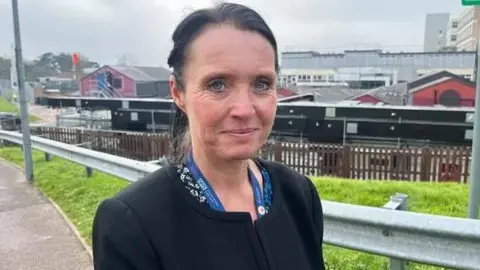
Ms Lawton says the hospital is spending about £9m a year just maintaining and repairing the current estate.
“Staff come to work to deliver outstanding care to our patients every single day and working within a hospital that is very old and breaks down is very frustrating for them,” she adds.
Torbay Hospital, one of the oldest in the NHS dating back to the 1920s, and Leeds General Infirmary have both reported problems with sewage leaks and flooding too and are in the same position.
Others have been put back even further, with a number told it could be the late 2030s before work begins.
Bosses at St Mary’s Hospital in London, which has been given a prospective start date of 2035 to 2038, have warned the chances of some parts of the estate closing due to patient safety concerns were “increasing day by day” as supplies of electricity, heating and water could not be guaranteed.
“We are now providing care in some buildings which are over 180 years old,” chief executive Prof Tim Orchard told the BBC.
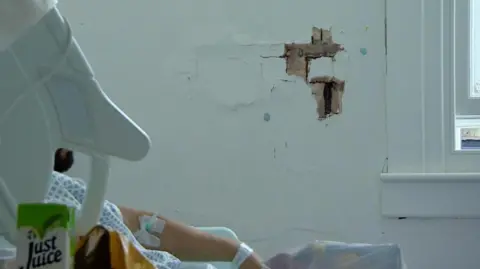
Meanwhile, Sam Higginson, the chief executive of Royal Devon Healthcare NHS Trust, says he is “deeply disappointed” that the redevelopment of his North Devon District Hospital may have to wait until 2038.
“For us that’s too far in the future,” he says. “There is a limit how long we can run that infrastructure for and we are right at that limit.”
He says he would be seeking money from NHS England and the government to try to keep the operating theatres and A&E running as best they can, warning otherwise the drive to tackle the hospital waiting list could be hit.
The government has said it is committed to the projects. But, as they will all now slip into the next Parliament and, as such, there is no money yet committed to cover the costs, there is real concern behind the scenes about whether this timetable can even be kept to.
“They’ve kicked us all into the long grass,” says one NHS leader, who wished to remain anonymous. “A commitment to do something in 10 years’ time is almost meaningless.”
Matthew Taylor, head of the NHS Confederation, which represents hospitals, says he understands such concerns, adding: “They feel let down.”
And he says the government will need to take into account how compromised the NHS leaders are with their dilapidated estates when it comes to judging their performance in the coming years.
Who is to blame?
Health Secretary Wes Streeting has firmly laid the blame at the Tories door, accusing them of leaving an “unfunded and undeliverable” hospital building programme for him to pick up.
This has been disputed by the Tories, who accused Labour of breaking promises and simply deciding not to prioritise the schemes.
The Liberal Democrats believe both parties have a case to answer. Health and care spokeswoman Helen Morgan says the public had been “led up the garden path” by the Tories, while accusing Labour of “dither and delay” and treating those affected with “complete disrespect” for trying to bury the news on the day of Trump’s inauguration.
Why there is a wider problem
But Siva Anandaciva, of the King’s Fund health think-tank, says the problems run far deeper than just these 18 delayed projects – and the others that have already been finished, started or approved for this decade.
He points out the backlog in repairs and maintenance across the entire NHS has been growing for years as capital spending budgets for buildings and equipment have been squeezed.
“The scale of the crumbling NHS estate is far wider than the rebuilds on the new hospital programme,” he says.
“Much of the mental health estate is some of the oldest within the NHS and it is estimated one in five GP premises pre-date when the NHS was formed in 1948.”
This lack of investment, he argues, is a “false economy” as it results in poorer patient care and hampers NHS productivity.
But it is not just the health service that is affected. A report published this week by the NAO pointed out other parts of the public sector are affected too, with school, court and prison buildings all struggling with maintenance backlogs too.
The sewage leaks and equipment failures at the likes of the Princess Alexandra Hospital and other sites awaiting rebuilds are just the tip of the iceberg it seems.
Data visualisation by Hannah Karpel
NewsBeat
Moment teens arrested trying to flee country after drive-by shooting | News


Two teens were arrested by police officers as they prepared to flee the country on a flight to Spain, after taking part in a broad daylight shooting at a Nottingham shopping centre.
Ramarni Spencer and Pharrell McLennon, both 18, were snared by police while queuing at a fast food restaurant at East Midlands Airport, ahead of boarding a flight to Alicante. Both were seen on CCTV two days earlier on 5 May 2024, firing pistols at another youth outside shops at the Bridgeway Centre, The Meadows before speeding away on an electric bike.
Spencer and McLennon appeared at Nottingham Crown Court on Friday (24 January), where they were sentenced for a combined 23-and-a-half years.
NewsBeat
US issues pause on foreign aid, leaked memo says

The US State Department has issued a halt to all existing foreign assistance and paused new aid, according to an internal memo sent to officials and US embassies abroad.
The leaked notice follows President Trump’s executive order issued on Monday for a 90-day pause in foreign development assistance pending a review of efficiencies and consistency with his foreign policy.
The United States is the world’s biggest international aid donor spending $68bn in 2023 according to government figures. The State Department notice appears to affect everything from development assistance to military aid.
It makes exceptions only for emergency food aid and for military funding for Israel and Egypt. The leaked memo’s contents have been confirmed by the BBC.
“No new funds shall be obligated for new awards or extensions of existing awards until each proposed new award or extension has been reviewed and approved,” says the memo to staff.
It adds that US officials “shall immediately issue stop-work orders, consistent with the terms of the relevant award, until such time as the secretary shall determine, following a review.”
It also orders a wide scale review of all foreign assistance to be completed within 85 days to ensure the aid adheres to President Trump’s foreign policy goals.
Secretary of State Marco Rubio – the US’s top diplomat – has previously stated that all US spending abroad should take place only if it makes America “stronger”, “safer” or “more prosperous”.
One former senior State Department official told the BBC the notice meant a “potentially huge” impact on foreign aid programmes funded by the US.
“One can imagine, for example, the humanitarian de-mining programmes around the world suddenly being told stop work. That’s a pretty big deal,” said Josh Paul, who oversaw Congressional relations on weapons transfers at the State Department until late 2023.
Dave Harden, a former US Agency of International Aid (USAID) mission director in the Middle East, told the BBC the move was “very significant”, saying it could see humanitarian and development programmes funded by the US around the world being immediately suspended, while the review is carried out.
He said it could affect a wide range of critical development projects including water, sanitation and shelter.
“The employees of the implementing partner or the [non-governmental organisation] would be able to be paid, but actual assistance, I think, needs to be halted,” said Mr Harden.
“I have gone through [assistance suspensions] many times when I was the West Bank and Gaza mission director, but that was specific to that account. This is global… it’s extremely broad,” he said.
“Not only does it pause assistance, but it puts a ‘stop work’ order in existing contracts that are already funded and underway. It’s extremely broad,” he added.
The AFP news agency reported the funding freeze could also potentially affect Ukraine, which received billions of dollars in weapons under Trump’s predecessor Joe Biden.
Rubio’s memo, justifying the freeze, said it was impossible for the new administration to assess whether existing foreign aid commitments “are not duplicated, are effective and are consistent with President Trump’s foreign policy”.
Rubio has issued a waiver for emergency food assistance, according to the memo.
This comes amid a surge of humanitarian aid into the Gaza Strip after a ceasefire between Israel and Hamas began, and several other hunger crises around the world, including Sudan.
The memo also said waivers have so far been approved by Rubio for “foreign military financing for Israel and Egypt and administrative expenses, including salaries, necessary to administer foreign military financing”.
The State Department has been approached for comment.
NewsBeat
Britain can learn from Trump’s positivity, says Rachel Reeves

Britain needs to be more positive and showing off its strengths, said Rachel Reeves.
The chancellor travelled to the World Economic Forum in Davos this week to meet global investors in her latest attempt to boost the UK economy after latest figures showed only slight growth.
Recent rises in borrowing costs threaten Ms Reeves’ economic plans, while leaders in the business sector continue to voice concerns over upcoming tax rises in April from her Autumn Budget.
However, on Monday, the International Monetary Fund forecast the UK economy would grow by 1.6 per cent in 2025 after a weaker-than-expected 2024.
And speaking to The Times, Ms Reeves said the country needed to be more positive.
She said: “I’ve been in sales mode this week in Davos. We’re all sick of Britain being in the slow lane, whether it’s British CEOs or British investors, and we want to see a revival of those animal spirits so that we can grow the economy and bring investment here.”

When asked if the country could learn from US president Donald Trump, she replied: “Yes, I think we do need more positivity.
“I’ve challenged businesses as well and said no one else is going to speak up for Britain apart from us. It hasn’t been a very British thing to say.
“We are absolutely fantastic as a country, we’ve got four of the best universities in the world. We’ve got some of the most amazing entrepreneurs with fantastic ideas. In all the sectors that are growing globally — AI, tech, clean energy — Britain has got unbelievable strengths in those sectors. We shouldn’t apologise for it and we shouldn’t be all polite about it. We should be shouting from the rooftops.”
But there are some in the business sector who have continued to put challenges at Ms Reeves’ door.
Last week, the boss of Next said the hike in National Insurance rates for employers in April will make it more difficult for people entering the workforce. On Thursday, Sainsbury’s announced it was cutting 3,000 jobs two months after it said Ms Reeves’ Budget would cost it £140m including higher wages.
There has also been criticism in the farming industry, where family farm owners are worried over changes to rules on inheritance tax from April next year.
Rachel Reeves has defended her decision to raise taxes at the Budget, insisting her plan provided the stability needed to secure growth and fix the nation’s services.
When asked if she will reverse the tax rises, Ms Reeves told The Times: “It’s not possible to back down on these things.
“The public finances were an absolute mess. I had to make a number of difficult decisions around welfare, on spending and tax, both in July and in the budget. If I start reversing tax increases, that stability that I’ve returned to the public finances would unravel.
“I know that I will come under pressure from different interest groups. I understand why they make the case that they make. I have a duty to make sure the sums add up.”
NewsBeat
Jobs cuts fears and PM ‘rejects whole-life term reform’

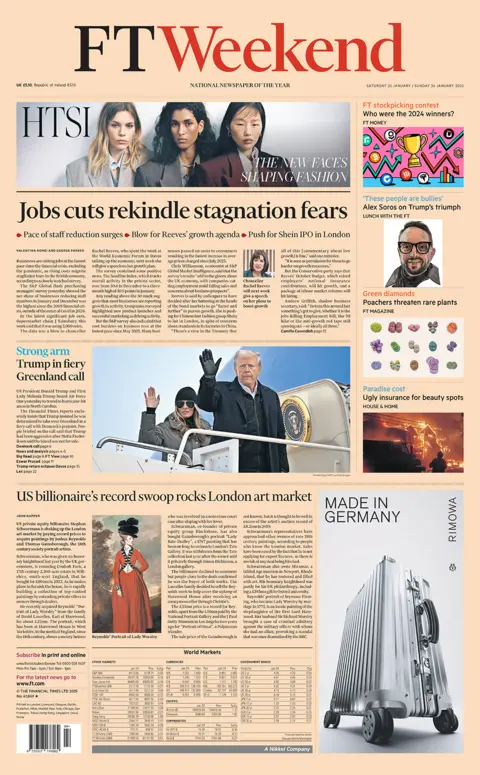




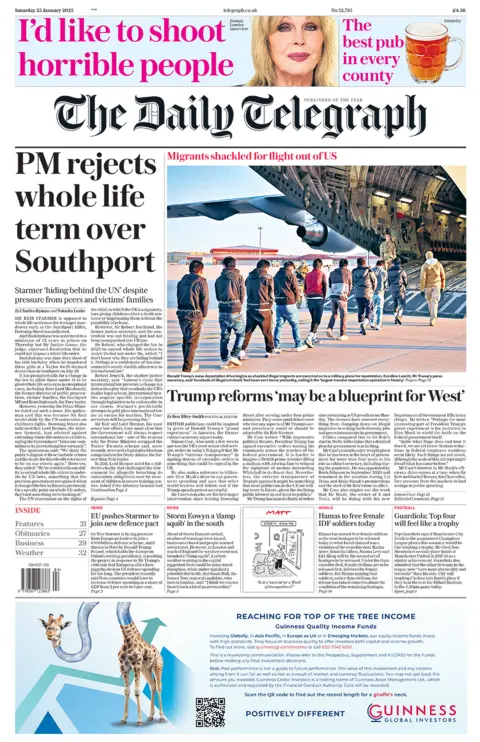





Politics
‘I’m a local business owner

A business owner from Peterborough is calling on Sir Keir Starmer to adopt Donald Trump’s plan for turbocharging the US economy, which rests on promoting local business, cutting government waste and clamping down on illegal immigration.
Gez Chetal, 57, is a pillar of his local community.
He runs the Thomas Paine Hotel in the market town of Thetford, Prismstart – a scheme to get ex-offenders, the homeless and the vulnerable back into work – and the Peterborough Community Business Awards every year. He also works with local schools to advise on career opportunities.
“I try to promote local farmers, independent businesses and small independents,” he told GB News.
Given Gez’s cast-iron commitment to his local community, it’s no surprise that he’s a cheerleader for Trump’s pro-business, America First agenda.
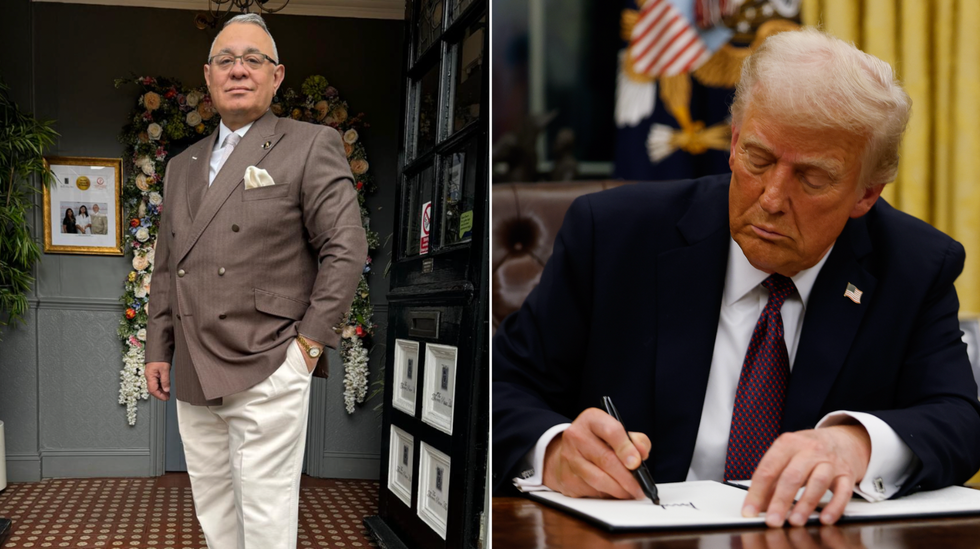
Gez Chetal calls on Starmer to adopt Trumpian policies to boost British economy
Gez Chetal/Getty Images
Upon returning to the Oval Office, Trump signed a flurry of executive orders to give domestic industries a shot in the arm, aiming to make them more efficient, and competitive, providing job security to millions of hard-working Americans.
“I am 100 per cent with Mr Trump on that. What he’s doing, we should be doing the same,” Gez said.
He was particularly taken with the executive order mandating that federal employees return to in-person work at their respective duty stations full-time, effectively ending remote work arrangements for civil servants.
“We’re promoting people working from home and going down to a four-day week,” the hotel owner lamented, referring to civil servants working remotely and Labour’s mooted plans for a shorter working week.
“How is that going to help the taxpayer by paying people for a five-day week to work a four-day week? What are we going to come to?” Gez asks.
In addition to not “being able to get hold of anyone”, he strongly feels that working from home has created a culture of laziness and sends the message that Britain is not open for business.
Trump’s crackdown on illegal immigration also makes sense from a business perspective, Gez claims.
The 47th President signed several executive orders beefing up border security and immigration on his first day in office.
He has promised the “largest domestic deportation operation in American history”, aiming to deport millions of undocumented immigrants.
This would apply to both those with criminal records and those without but residing illegally in the US.
LATEST MEMBERSHIP DEVELOPMENTS
Please write at least 1 paragraphs
When asked whether Keir Starmer should get equally as tough on immigration, Gez said: “We need to curb it.”
He explained: “I have nothing against any migrants whatsoever because we need them in this country to work because our lot are not working. We’ve got skill shortages. We’ve got manpower shortages.
“But we must not bring down areas by bringing in people who don’t really speak English or integrate into the community. Unfortunately, it just doesn’t work.”
As a hotel owner, he’s keen to attract people to the area, but an influx of people who don’t seek employment and “frighten” the locals does the opposite, Gez adds.
Housing migrants is a particular sore spot for the hotelier.
“I’m paying silly amounts of tax. But what am I getting for it? Nothing. I’m just making sure that all these bills are covered for everyone.”
Protecting local businesses and jobs is the Trump policy that arguably resonates the most with Gez.
The Republican leader has unveiled a slew of policies and executive orders focusing on deregulation, tax policy, and making domestic industries more competitive.
This includes directives to eliminate two regulations for every new one introduced, which directly impacts small and local businesses by reducing compliance costs and simplifying operations.
Trump’s administration has emphasised “Buy American” policies, encouraging federal agencies to purchase goods made in the US, thereby supporting local manufacturers and businesses.
“It’s fantastic,” Gez told GB News, adding: “It brings the whole community together.”
NewsBeat
Prisoner released early under government scheme assaulted ex-partner the day after he was freed | UK News

A former actor who was released from prison in error as part of the early release scheme has been convicted of assaulting his ex-partner the day after he was freed.
Jason Hoganson, who starred in the 1987 film Empire State, was one of around 1,700 prisoners who walked free on 10 September 2024 as part of the government’s plan to ease overcrowding in prisons.
However, the 53-year-old was actually one of 37 inmates who were released by mistake when the scheme was rolled out.
Despite being released early in error in September, it is understood Hoganson is likely to have been released a few days later anyway under the terms of his original sentence.
Heavily-tattooed Hoganson was photographed giving a thumbs up as he left HMP Durham after serving half of an 18-month sentence for assaulting his ex-partner Rachel Usher and breaching a restraining order.
He was arrested in Newcastle’s West End the following day after going to Ms Usher’s flat and slapping her.
Ms Usher “very sadly passed away” after Hoganson was returned to custody, a court heard.
Her cause of death has not been reported but there is no suggestion it is linked to Hoganson.
The former actor was found guilty on Friday of assaulting Ms Usher and two counts of breaching a restraining order by visiting her home on 11 September 2024 and writing her a letter from prison a week earlier.
Hoganson was removed from Newcastle Crown Court in the middle of his evidence after he started shouting obscenities at prosecutor Lisa Callum, and was not present to hear the verdict.
A statement from Ms Usher read by Ms Callum said the two had been in a relationship for about six years and Hoganson “used to hit me all the time”.
The statement said: “I’m aware he was released two days ago – earlier than he should have been.”
Ms Usher said she was leaving her flat to go to the shops on 11 September and was waiting for a lift when she saw Hoganson running towards her.
She said: “He opened the door of the stairwell and slapped me across the side of my face.
“He was shouting and bawling and seemed really angry. He called me a slut and said there was someone in my flat.
“He said ‘can we go somewhere’ and when I said ‘no’ he got even more angry.”
Ms Usher said she called the police and Hoganson started to hit his head on an electrical box on the wall.
Her statement read: “I do not have any injuries but the slap was powerful. There was a lot of force behind it.”
Ms Usher also described how receiving the prison letter, where Hoganson told her he loved her, made “me feel horrible and sick inside”.
Read more from Sky News:
Ex-Premier League footballer ‘kicked wife in head’, court hears
World’s largest iceberg on crash course with island
Record number of children live in B&Bs beyond legal limit
Hoganson denied the offences, claiming he went to the block of flats to get his belongings from a man who lived five floors above Ms Usher.
He said he went to get the lift back to the ground floor and saw Ms Usher when it stopped on her floor.
Hoganson told the court: “Obviously she panicked. She came straight for me and went to attack me. I’ve moved out of the way down the stairs. I’ve never attacked Rachel.
“I never even spoke to her, I just wanted to get out of there.”
Defence lawyer Mark Styles said the defendant had been “unable to process” the death of Ms Usher because he has been in custody, and had experienced a deterioration in his mental health.
He is due to be sentenced at Newcastle Crown Court on 25 February.
NewsBeat
Nail-biting finale brings series to dramatic end

Entertainment reporter
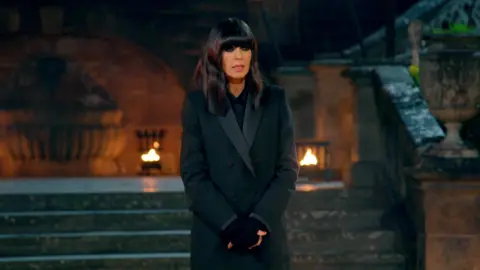 BBC
BBCWarning: This article reveals the outcome of The Traitors.
The third series of The Traitors has been won after a nail-biting conclusion.
The finale saw faithfuls Francesca Rowan-Plowden, Alexander Dragonetti, Leanne Quigley and Jake Brown go up against traitor Charlotte Berman.
After weeks of challenges, murders, roundtables and banishments, the final prize fund stood at £94,600 after the last challenge of the series.
Ex-soldier Leanne and project manager Jake were the final two and split the money after revealing they were both faithfuls.
Leanne squealed and thanked Jake “for not letting me down”.
Jake said: “I feel like my body feels like it’s going to collapse but I’m just so happy.”
The final roundtable was different from previous years in that players who were banished did not reveal whether or not they were a traitor or a faithful as they left.
That meant the remaining contestants had to rely solely on their instincts about whether or not there were any traitors left in the game.
A late twist this year saw Francesca become “the seer”, a power that enabled her to find out the true status of one other contestant.
Unfortunately for Charlotte, the last remaining traitor, Francesca chose her, and was able to find out her fellow player was not the faithful she had assumed.

The finale comes after a phenomenally successful series for the BBC, which has been watched by an audience of more than nine million, a figure which will rise as more viewers catch up.
That places this series above the previous two and makes The Traitors one of the biggest hits currently on British television.
As in previous years, several of this year’s contestants attracted devoted followings online as the series progressed, with Linda in particular being one of the breakout social media stars.
Her delightfully appalling acting prompted hundreds of gifs and memes on social platforms in recent weeks.
Other stars of the series have included the impressively cunning traitor Minah, the extremely polite Alexander, the intuitive Fozia, and, of course, converted traitor Charlotte and her fake Welsh accent.
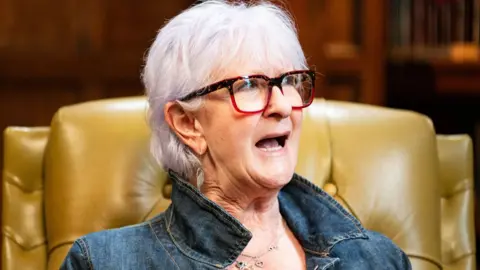
The third season has had a notably different narrative arc to the previous two.
In the first season, three faithful contestants won after rooting out the last remaining traitor, Wilf, during the finale. In the second series, original traitor Harry made it to the final, and won.
The third season is different in that none of the original traitors selected in the first episode made it to the end.
The differing routes of each series suggest the show’s format has the potential to last for several more years, as each finale has kept viewers guessing and been hard to predict.
However, the contestants are becoming increasingly aware of the way the show is produced, speculating on the decisions being made behind the scenes.
For example, one of this year’s faithfuls, Elen, correctly speculated in an early episode that there would be more female traitors this year, following a male-heavy line-up last year.
As players become progressively more savvy, producers will have to keep making changes to make sure the show remains fresh and unpredictable, keeping players on their toes.
A celebrity version of The Traitors will air later this year, giving the format another new spin. It has not yet been confirmed who will take part.
NewsBeat
UK ticket holder scoops £83m EuroMillions jackpot

A UK ticket-holder has won Friday’s £83 million EuroMillions jackpot, National Lottery operator Allwyn said.
They matched all five main numbers and two lucky stars to take home the entire jackpot.
The winning numbers were 02, 11, 19, 30, 49. The winning lucky stars were 03 and 08.
If claimed, the ticket-holder will decide whether to go public once they receive the money.
Unless they announce the news, there will be no information on where the winner bought the ticket, or whether they entered the draw as an individual or part of a syndicate.
Andy Carter, senior winners’ adviser at Allwyn, operator of The National Lottery, said: “Amazing, what a fantastic night for a single UK ticket-holder who has scooped tonight’s £83 million EuroMillions jackpot.
“This lucky winner represents the first UK EuroMillions jackpot win of 2025, what a way to start the year.
“Players are urged to check their tickets and to give us a call if they think they are tonight’s lucky winner.”
Last month, a UK ticket-holder received £177m after winning the jackpot in November. That was the third biggest ever National Lottery pay-out.
-

 Fashion8 years ago
Fashion8 years agoThese ’90s fashion trends are making a comeback in 2025
-

 Entertainment8 years ago
Entertainment8 years agoThe Season 9 ‘ Game of Thrones’ is here.
-

 Fashion8 years ago
Fashion8 years ago9 spring/summer 2025 fashion trends to know for next season
-

 Entertainment8 years ago
Entertainment8 years agoThe old and New Edition cast comes together to perform You’re Not My Kind of Girl.
-

 Sports8 years ago
Sports8 years agoEthical Hacker: “I’ll Show You Why Google Has Just Shut Down Their Quantum Chip”
-
Business8 years ago
Uber and Lyft are finally available in all of New York State
-
Entertainment8 years ago
Disney’s live-action Aladdin finally finds its stars
-
Sports8 years ago
Steph Curry finally got the contract he deserves from the Warriors
-
Entertainment8 years ago
Mod turns ‘Counter-Strike’ into a ‘Tekken’ clone with fighting chickens
-
Fashion8 years ago
Your comprehensive guide to this fall’s biggest trends

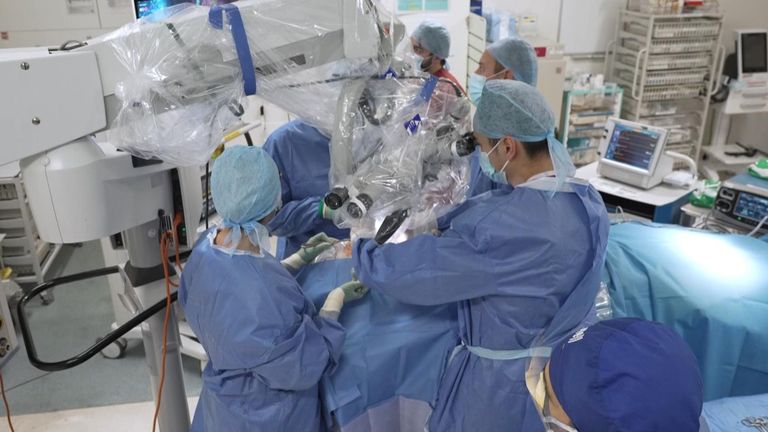
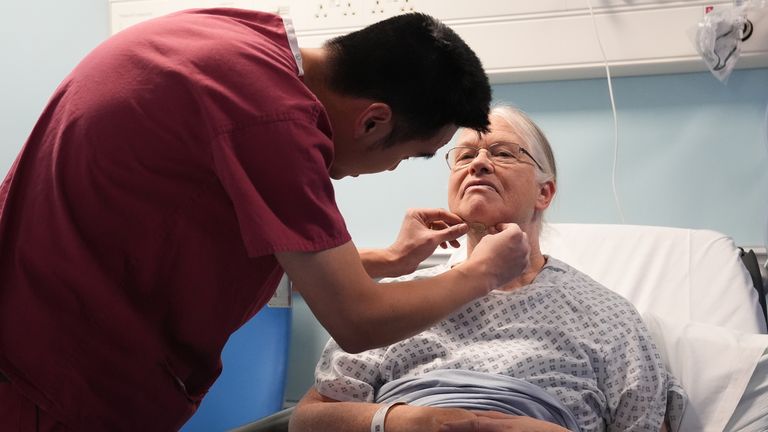
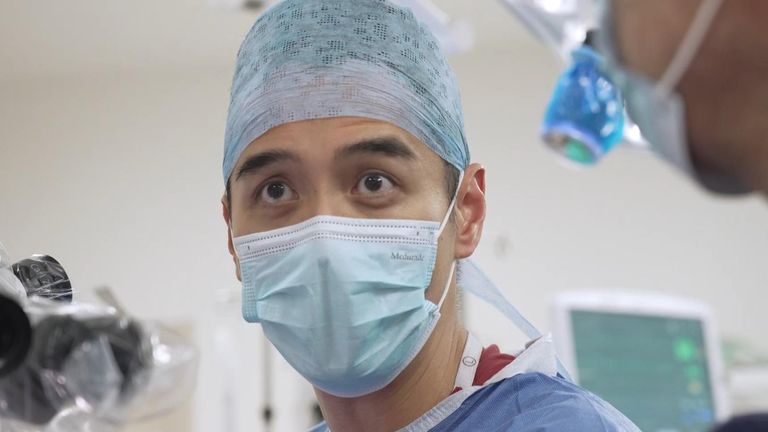

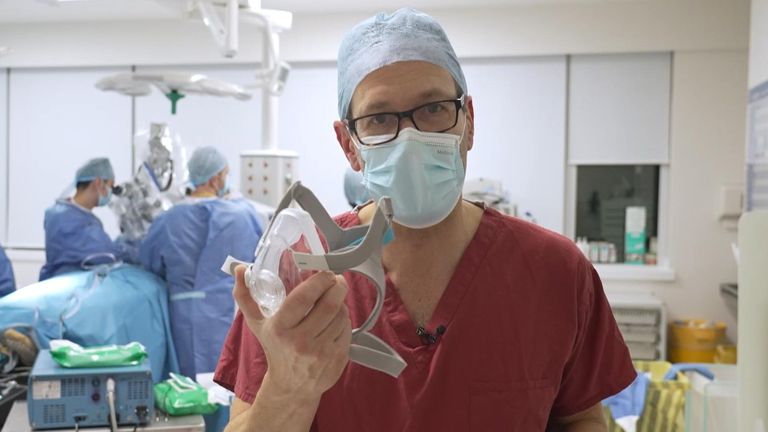



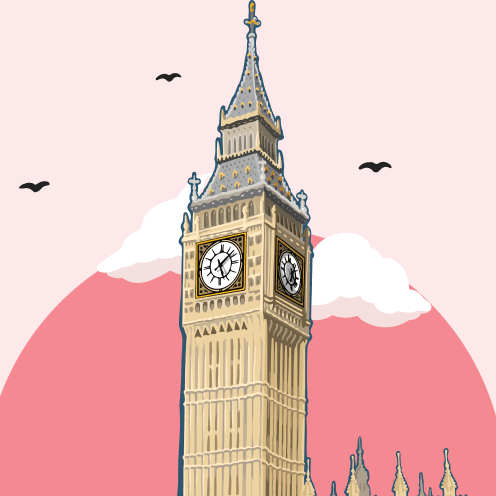




You must be logged in to post a comment Login